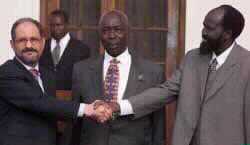Arab League Secretary General, Amr Moussa call on all Arab countries to accept the agreement between the Khartoum Government and the rebel Sudanese Peoples Liberation Army (SPLA). Speaking after a meeting with U.S. envoy to Sudan, John Danforth, Mr. Moussa stressed that practical steps should taken to consolidate Sudan Unity during the six-year interim period before a referendum giving the south the option to secede.
Mr. Danforth arrive in Cairo Wednesday on a several days visit to Egypt.
During the visit the U.S. envoy will also confer with the Egyptian foreign minister, Ahmad Mahir and Osama Al-Baz, political advisor to Egyptian President Hosni Mubrak. Discussions will focus on developments in Sudan in light of the recent Khartoum-SPLA accord.
The U.S. special envoy for Sudan said Wednesday Sudanese unity was
Speaking after the meeting with Mr. Moussa, Mr. Danforth told reporters almost all parties recognized that a unified Sudan was desirable but, he added, it would hinge on whether the government recognized the rights of southerners.
"The issue is what will happen in the next six years," he said. "Whether there will be a just peace. Whether the rights of the people who are in the minority and the people in the south will be recognized and whether they will be full participants in the country."
The Arab League has said Arab states want to preserve the unity of Sudan, split by civil war between (SPLA) from the mainly Christian and animist south and the northern Muslim Arabic speaking government.
In the first round of talks, the government said it would exempt the south from Islamic sharia law as well as agreeing to the referendum. A second round of peace talks between rebels and the government began Monday in Kenya and will have to deal with issues including a cease-fire and power and wealth sharing.
Danforth said a Sudan peace deal could enhance relations between Khartoum and the United States, which in 1997 imposed sanctions on Sudan on the grounds that it was sponsoring terrorism.
Relations between the two countries reached a low point in 1998 when the United States bombed a pharmaceutical plant in Khartoum which it said was producing ingredients for chemical weapons.
Danforth said normalisation hinged on Sudanese cooperation on "anti-terrorism," allowing humanitarian aid groups access to the country and a north-south peace deal.
If a peace deal were reached, "there would clearly be progress toward major change in relations between the two countries," he said.
Sudan and the United States resumed dialogue in 2000 and U.S. efforts have been seen as key to driving forward current peace talks.
Danforth added that President Bush, whom he spoke to recently about Sudan, was "intensely interested and optimistic about the possibility of peace in Sudan.
PHOTO CAPTION
President Daniel Arap Moi of Kenya (C) looks on as envoys from Sudan's warring factions shake hands in Nairobi, July 20,2002. Commander Salva Kiir (R) from the rebel Sudan People's Liberation Movement (SPLM) and Sudan's presidential peace adviser Ghazi Salah al-Din (L) said they had made a major breakthrough in talks to resolve the 19-year-old conflict and hoped to sign a comprehensive peace deal after further talks in August this year. (Antony Njuguna/Reuters)
- Jul 20 4:23 PM ET
- Author:
& News Agencies - Section:
WORLD HEADLINES


 Home
Home Discover Islam
Discover Islam Quran Recitations
Quran Recitations Lectures
Lectures
 Fatwa
Fatwa Articles
Articles Fiqh
Fiqh E-Books
E-Books Boys & Girls
Boys & Girls  Women
Women










